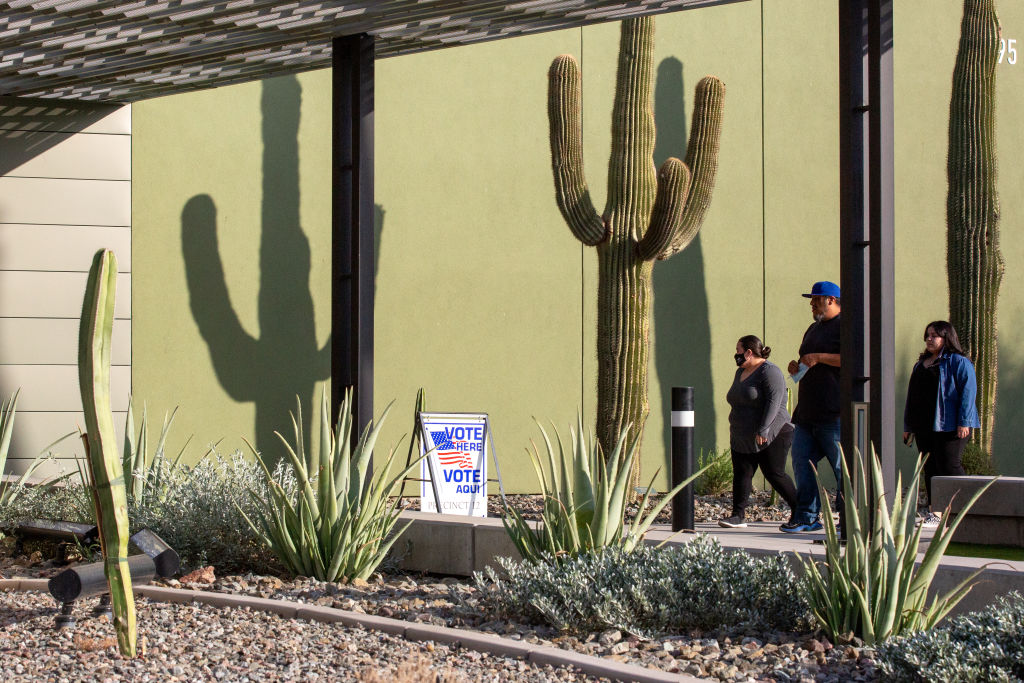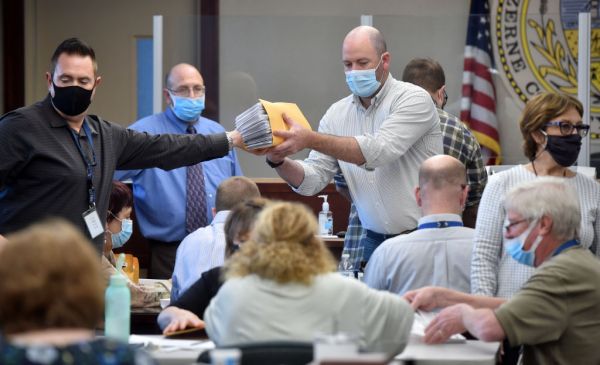A Facebook post from a group called Republican Patriots claims that Arizona has “banned voting without proof of citizenship.”
The statement is missing important context. Arizona does have a state law that requires proof of citizenship to vote, but the law is not new, and federal law requires only a declaration of citizenship to register to vote. As such, Arizona’s law has faced various legal challenges over the last two decades, and as it stands, voters without proof of citizenship are permitted to vote in federal elections.
Non-citizen voting has long been a source of contention in the state of Arizona, where non-citizens make up 13 percent of the state population. In 2004, Arizona voters approved Proposition 200, which required documentary proof of citizenship to vote.
When Arizona voters approved Proposition 200, the Arizona Legislature sought to apply this proposition to state and federal elections. But, as Thomas Collins, executive director for the nonpartisan Arizona Citizens Clean Elections Commission, explained to The Dispatch, the law has faced various legal challenges since then.
The Supreme Court ruled in 2013 in Arizona Intertribal Council v. Arizona that Arizona must allow individuals who register without proof of citizenship to vote in federal elections. In response, Arizona decided that voters could use the federal voting registration form for federal elections, but must use the state form, which required additional documentary proof of citizenship, to register for state elections.
That prompted a lawsuit in 2018 from individuals who argued that the rules discriminated against those without easy access to proof of citizenship, which resulted in a consent decree that ended the two-registration form system. Instead, then-Arizona Secretary of State Michele Reagan agreed in the decree that the state of Arizona would eliminate the two-form registration system and would check forms submitted without additional documentary proof against state documentation, such as driver’s license records, to determine citizenship status.
In 2022, Arizona legislators enacted two laws, House Bill 2492 and 2243, which required documentary proof of citizenship to register to vote and created new regulations about citizens moving states after voting, respectively. U.S. District Judge Susan Bolton ruled on the new voting laws, deciding that the laws were not discriminatory and that Arizona did have an interest in preventing voter fraud. However, Bolton also ruled that requiring individuals to use a state registration form to include their place of birth violates part of the Civil Rights Act and part of the National Voter Registration Act.
On July 18, the 9th Circuit Court of Appeals ruling allowed a partial stay of the lower-court decision by Bolton. Based on the circuit court decision, federal-only voters are allowed to vote in federal elections only if they register using a federal voter registration form, which few voters currently register with. This ruling will remain in effect until September, when an appeals panel hears the case.
On August 8, the Republican National Committee asked the Supreme Court to revive certain parts of an Arizona voting law requiring proof of citizenship to register to vote in the state, including to vote in presidential elections and to utilize mail-in ballots. They have asked for Justice Elena Kagan, who oversees the 9th Circuit, to respond to this request by August 16 ahead of the presidential election later this fall.
While federal law allows voters to declare their citizenship for the sake of registering to vote, it is worth noting both that non-citizen voting is illegal in federal elections in the United States and that experts have found non-citizen voting to be very rare.
“Someone would have to knowingly and intentionally commit a class 6 Felony if they did vote as a non-citizen, and it would result in their revocation of their legal status in the USA and they would likely face deportation,” JP Martin, deputy communications director for Arizona Secretary of State Adrian Fontes, told The Dispatch in an email.
If you have a claim you would like to see us fact check, please send us an email at factcheck@thedispatch.com. If you would like to suggest a correction to this piece or any other Dispatch article, please email corrections@thedispatch.com.






Please note that we at The Dispatch hold ourselves, our work, and our commenters to a higher standard than other places on the internet. We welcome comments that foster genuine debate or discussion—including comments critical of us or our work—but responses that include ad hominem attacks on fellow Dispatch members or are intended to stoke fear and anger may be moderated.
With your membership, you only have the ability to comment on The Morning Dispatch articles. Consider upgrading to join the conversation everywhere.